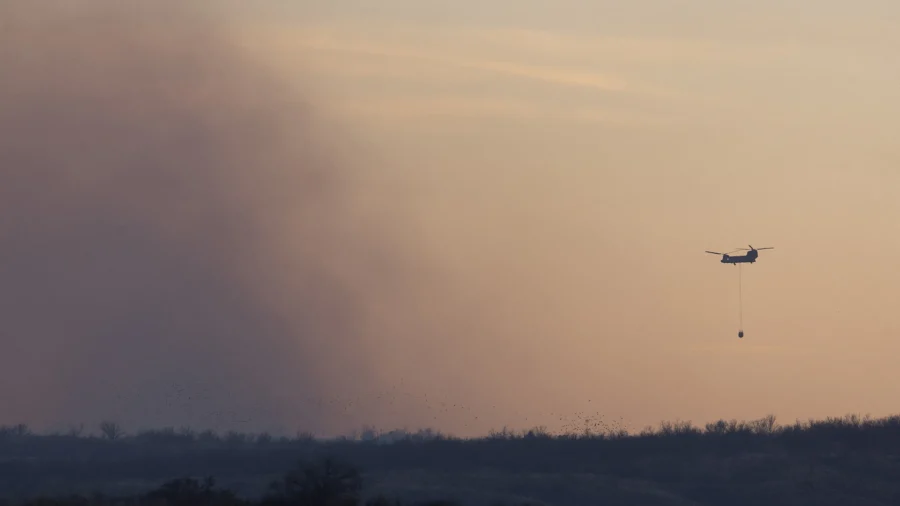The massive wildfires burning across the Texas Panhandle that killed two people, destroyed hundreds of homes, and killed thousands of livestock were caused by power lines, officials announced on Thursday.
Texas A&M Forest Service investigators have concluded power lines ignited the Smokehouse Creek fire as well as the nearby Windy Deuce.
On Thursday, utility provider Xcel Energy acknowledged that its equipment appears to have played a role in sparking the Smokehouse Creek fire, which started Feb. 26 and grew into the largest blaze in state history.
“Based on currently available information, Xcel Energy acknowledges that its equipment appears to have been involved in an ignition of the Smokehouse Creek fire,” the company said in a statement.
However, the Minnesota-based company said it does not believe its equipment was responsible for the Windy Deuce fire that impacted numerous structures in and around Fritch, northeast of Amarillo.
“Xcel does not believe that its facilities caused the ignition of the Windy Deuce fire, and we are not aware of any allegation that Xcel Energy’s facilities caused this fire,” the company continued.
The Smokehouse Creek fire has scorched 1,059,570 acres, or nearly 1,700 square miles, since it began on Feb. 26. As of Thursday, it was 74 percent contained, and the Windy Deuce fire, which has burned 144,206 acres, was 89 percent contained, according to the Texas A&M Forest Service.
Downed power lines and other utility equipment have led to other massive wildfires, including the deadly blaze in Maui last year and a major California wildfire in 2019.
Xcel Energy said it also “disputes claims that it acted negligently in maintaining and operating its infrastructure.”
The Smokehouse Creek fire was among a cluster of fires that spread across the rural Panhandle last week and prompted evacuation orders in a handful of small communities. That fire also spilled into neighboring Oklahoma.
Bob Frenzel, CEO and president of Xcel Energy, said the company is committed to supporting the recovery of the region.
“Xcel Energy, through our Southwestern Public Service Company (SPS) subsidiary, has operated in the Texas Panhandle for more than 100 years,” Mr. Frenzel said in a statement. “The people in this region are our friends, neighbors, and relatives. We are deeply saddened by the losses incurred in this community, and we are committed to supporting its renewal and recovery.”
The company said it has set up a claims process for those who had property or livestock destroyed by the Smokehouse Creek fire.
“We will review and respond to any such claims in an expeditious manner, with a priority on claims from any person that lost their home in the Smokehouse Creek fire,” it said.
Widespread Destruction
As many as 500 homes and barns are believed to have been destroyed in the wildfires, according to officials.
On Friday, March 1, Melanie McQuiddy, a resident of Canadian, a city in Texas, filed a lawsuit in Hemphill County, alleging that a downed power line near the town of Stinnet sparked the Smokehouse Creek blaze that engulfed her home on Feb. 28.
Xcel Energy, along with Southwestern Public Service Company (SPSC), a subsidiary of Xcel Energy, and Osmose Utility Service, are accused of “gross negligence” after a wooden utility pole allegedly “splintered and snapped” during high winds, igniting the wildfire that spread to nearby Canadian.
Osmose is a Georgia-based contractor allegedly hired to inspect and report on the company’s utility poles, according to court documents.
Mike Adams, Osmose CEO, told The Epoch Times in an email earlier this week that it takes the allegations “seriously” and that the company is “fully cooperating” with investigators. SPSC did not respond to The Epoch Times’ request for comment.
Ms. McQuiddy, who is represented by the Watts Law Firm in Houston, is seeking over $1 million in damages for the loss of her property. The law firm has previously represented plaintiffs in lawsuits related to wildfires in Maui and California.
Earlier this week, Department of Agriculture Commissioner Sid Miller said preliminary reports have estimated at least 3,000 head of cattle have been destroyed in the wildfires.
Cattle rancher Dale Smith said he has lost up to 50 head of cattle out of the 3,000 that graze on his property east of Stinnett.
“We’re still trying to tally up the cattle losses,” Mr. Smith said. “It burned probably 70–80 percent of the ranch.”
He said much of the grazing land would grow back quickly with the right amount of rain and moisture, but he said he couldn’t replace the 100-year-old cottonwood trees that dotted his ranch.
Firefighters were able to save three camps on his ranch that included barns and other buildings.
Mr. Smith said he believes a faulty power line sparked the blaze, which spread quickly in the high winds and dry conditions.
“These fires are becoming a regular occurrence. Lives are being lost. Livestock are being lost. Livelihoods are being lost,” he said. “It’s a sad story that repeats itself again and again because public utility companies and oil companies responsible for these power lines aren’t keeping them maintained.”
Mr. Miller said donations could be made to the Star Fund grant program to assist residents, ranchers, and farmers affected by the wildfires.
From The Epoch Times

